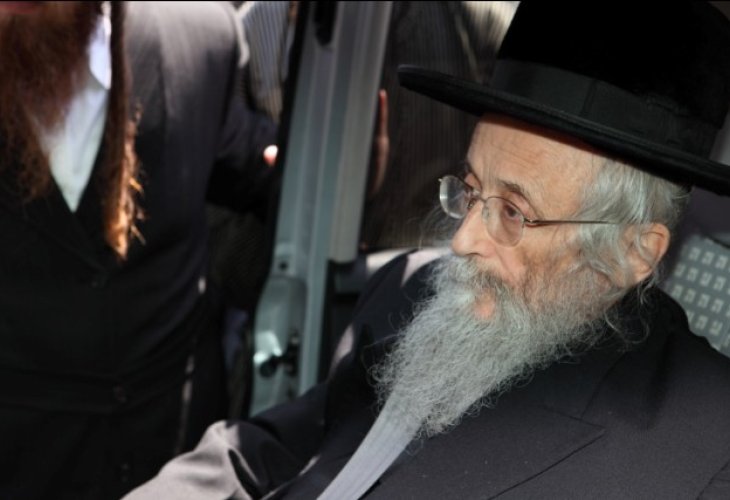Personal Stories
"Always Hold On to Hashem": A Father's Final Words Before Auschwitz
A Holocaust survivor shares the lasting impact of his father's final blessing, filled with faith and love for Hashem
 Rabbi Yitzchak Tuvia Weiss (Photo: Yaakov Naumi / Flash 90)
Rabbi Yitzchak Tuvia Weiss (Photo: Yaakov Naumi / Flash 90)A special interview with the Gaavad of the Edah HaChareidit, Rabbi Yitzchak Tuvia Weiss, offers a deeply moving glimpse into the kindness and miracles Hashem showed him throughout his life. In this conversation, Rabbi Weiss recalls his father, Rabbi Shlomo Weiss, who was murdered in the Holocaust, and the powerful spiritual legacy he left behind.
“What Would We Do Without Rashi?”
Rabbi Weiss remembers his father with longing and gratitude, saying that all he has today is thanks to his father and his teachers. “Father invested great efforts in me,” he said. “I remember when he would learn Gemara with me, he’d suddenly jump up with excitement and say, ‘What would we do without Rashi? How would we understand anything without his sweet explanations?’”“Father Asked Me to Pray for People in Need”
“My father was a deeply righteous Jew, devoted completely to Hashem. I remember being just six years old, and he would hand me notes with names of people who needed healing or help with parnassah (livelihood), written in German. He truly believed that my small-child’s prayer had power.”“My Parents’ Prayers Still Echo in My Bones”
With deep emotion in his voice, Rabbi Weiss shared: “My father’s prayer is still engraved in my very bones. He had to leave early for work, so he would daven at home. I remember waking up and hearing his voice. The way he said ‘Az Yashir’... so heartfelt, so full of longing. That sound never left me.”
“My mother, may she rest in peace, also had deep yirat Shamayim (awe of Heaven). Each morning as I left for school, she would already be praying. She’d just nod to me mid-prayer.”“If Only My Ne’ilah Felt Like His Birkat Hamazon”
“My father never rushed Birkat Hamazon (Grace After Meals). He would eat some bread before work, and then say the blessings slowly, carefully, with deep feeling. If only my Ne’ilah prayer on Yom Kippur could resemble even a bit of the way he said Birkat Hamazon on a regular day. He would close his eyes and say every word with joy and meaning.”
Rabbi Weiss softly sang the words as his father once had: “That we... may not... be ashamed... nor humiliated... nor stumble... forever... and ever.”The Time He Fainted During “Rachem Na”
“One Pesach Seder night, my father fainted while saying the words ‘Rachem Na’ (Have mercy, please) in Birkat Hamazon. They had to carry him out still in his chair.
“It is written in halachah (Jewish law) that a knife should not be on the table during Grace After Meals, because once, a deeply religious Jew became overwhelmed with grief at that very moment and harmed himself. When I saw my father faint from emotion, I understood that halachah. Even when he didn’t faint, he was on fire during Birkat Hamazon. Every time he said it, it was like a Torah lesson.”“Thanks to a Rav’s Advice, I Had Two More Years With Father”
In 1937, when Rabbi Weiss was eleven, he asked his father to take him out of public school and send him to a full-time Torah yeshiva. He cried and begged: “I don’t want to learn with the non-Jews. Please send me somewhere I can study Torah all day.”
But there was a problem. In Slovakia, the law required all boys to attend government schools. So his father took him to the great Rav Yehoshua Buxbaum to ask for guidance.
Rav Buxbaum’s answer surprised him. Without hesitation he said: “It is better for you to stay where you are, near your father’s table, even if it means attending a gentile school, than to be far from him in a Jewish one.”
Rabbi Weiss later understood the deeper wisdom of that answer. Two years later, the war broke out. “Thanks to that answer, I had two more full years at home with my father. I drew so much Torah and love of Hashem from him in those years. I will forever be grateful for that time.”His Father’s Last Words Before the Separation
When the Nazis came to power, young Yitzchak Tuvia was sent to safety in London. At the train station, as they said goodbye for the last time, his father gave him a siddur (prayer book) with the words written inside in Yiddish: “Halt zich in Eibishter imetum in iberal” – Hold on to Hashem always and everywhere.
Years later, the siddur was lost, but the message remained etched in his soul forever.A Final Letter from the Road to Auschwitz
Before being deported to Auschwitz, Rabbi Shlomo Weiss managed to send one last letter to his son in London. In that letter, he wrote words of deep emunah (faith):
“You should know that whatever Hashem does, that is the best. Only His way is truly good. There is no other way it could or should be.”
In another letter, he gave specific instructions: “Please sing the Shabbat songs just the way I did.” And Rabbi Weiss said, with tears in his eyes, “To this day, I sing them the way we sang at home with my father.”
This remarkable testimony from Rabbi Weiss not only honors the memory of his father but reminds us of the strength that comes from faith, from prayer, and from holding on to Hashem with all our heart, no matter where we are.

